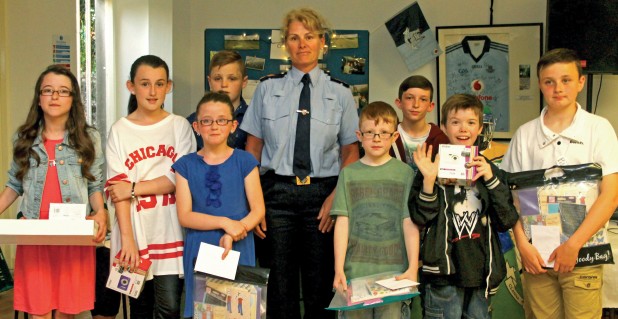
Spellman awards, from left: Rachel Griffin, Chloe McKevitt, Kelly Crosby, Aaron Lynch, Superintendant Lorraine Wheatley, Oisin McMahon, Shane Crosby, Jordan Collins, Dylan Helch.
PLEASE NOTE: This article was originally wrote by News Four journalist, Liam Cahill, and was originally published in the August/September 2013 issue of News Four. You can view the original article here.
There’s no doubt excessive budget cuts have had an impact on local services across the board, but some groups such as the South Inner City Drugs Task Force are trying to look beyond the negativity of budget cuts and dwindling services.
“We knew there was a major cut coming down the line, so we looked at every single project that we fund and put in place a system where we protect frontline services,” says Colm Browne, the Task Force Coordinator for the South Inner City Drugs Task Force.
This particular drugs task force was set up in 1997 and funded as part of the National Drugs Strategy. It runs as sort of an umbrella organisation which includes 33 funded projects including: Rinn Training, Merchants Quay Project, The Mercy Family Centre, Teen Challenge and Ringsend and District Response to Drugs (RDRD).
“The Drugs Task Force were very proactive in their approach in terms of the task for the area. What we did was put money aside under different headings like the cocaine problem over the past three or four years and put that money into cocaine awareness,” says Teresa Weafer, Manager of RDRD.
Despite budget constraints, Teresa’s team provides a number of assessment and treatment options, counselling services, family support groups and addiction support groups for people who may have a drug problem. Developing a dedicated key worker, and necessary support mechanisms for people who may be suffering from an addiction, is a priority for this program.
spellman3“I think the Drugs Task Force would like to (give more money) but I don’t think the Government would. The Government are the ones who are holding the purse strings of the Task Force,” says Teresa.
The Drugs Task Force also funds groups like Community Response, which help people with drug problems, HIV and Hepatitis C. It offers drug awareness training to project workers and family support groups. The force also funds the South West Inner City Network (SWICN) who run an education and youth service, providing services for the local community. Similarly funded is RADE (Recovery Through Art, Drama and Education) who engage drug users with the arts, allowing them to creatively express themselves through a variety of workshops such as drama, writing and film.
Despite the courageous work of many of these groups, a strangling of resources and calls for an evaluation of the current services provided has overtaken some of the positive work which is ongoing on the ground.
The South Inner City Drugs Task Force’s current funding stands at just over €2 million. Since 2008 that number was reduced by €318,000, which is a 15% cut to their total budget. “I would say we have in place a system where we can manage but it’s nearly a death by a thousand cuts,” says Browne.
Despite this, hundreds of addicts and their families receive vital support through the variety of services still being provided by the South Inner City Drugs Task Force.








